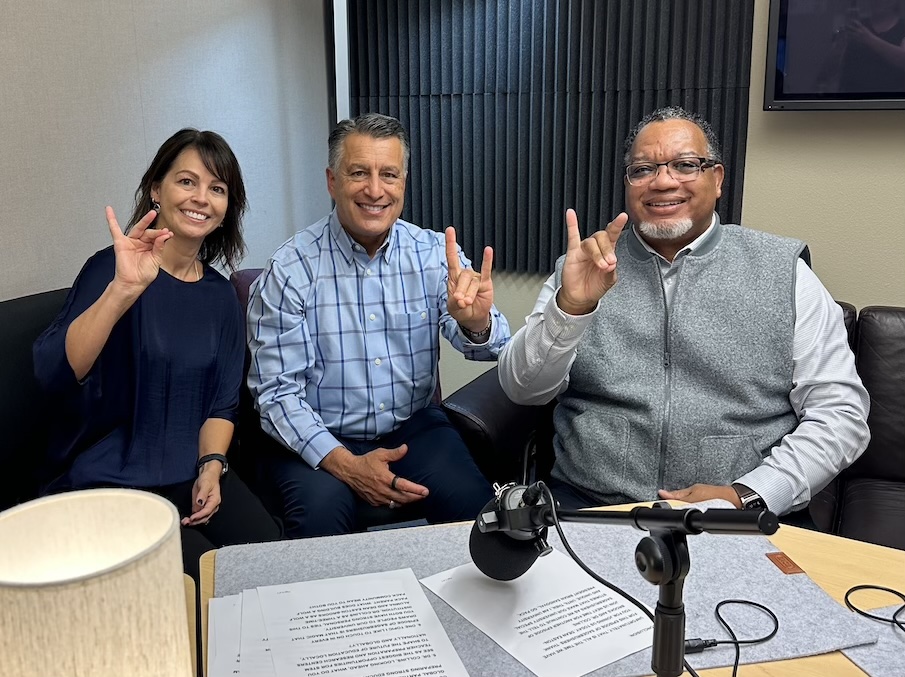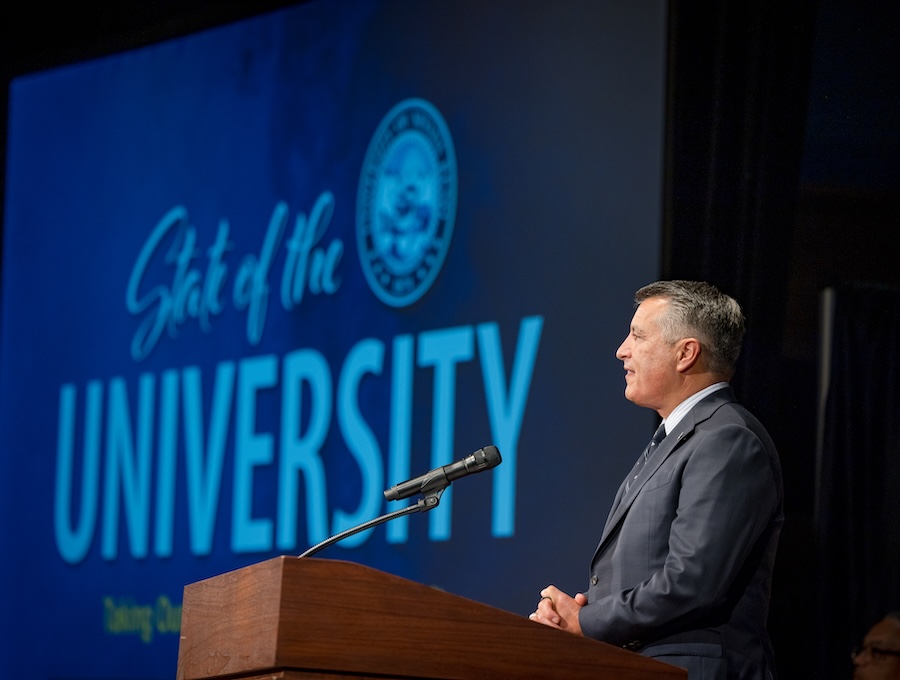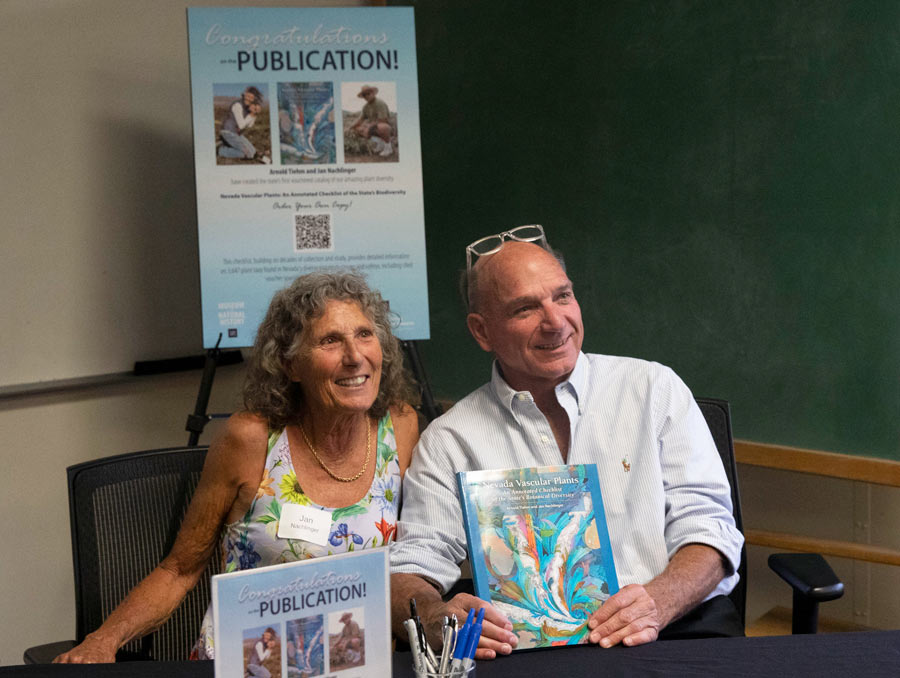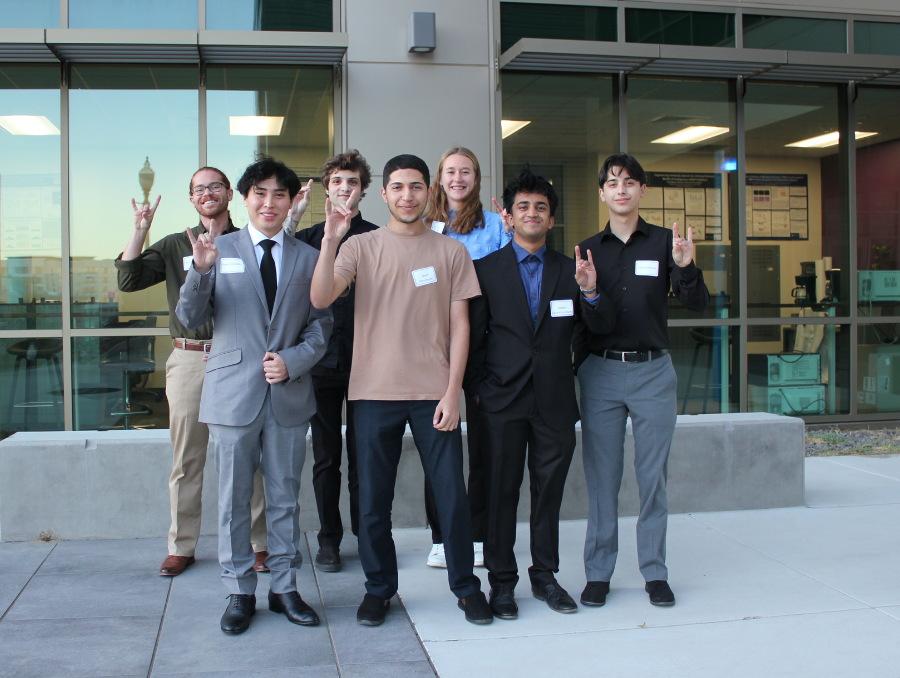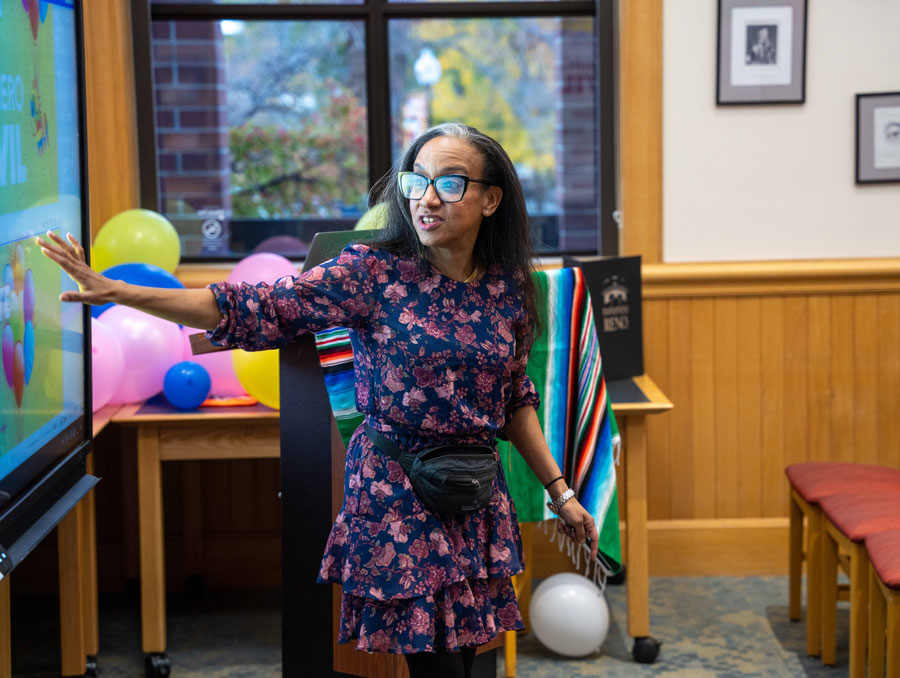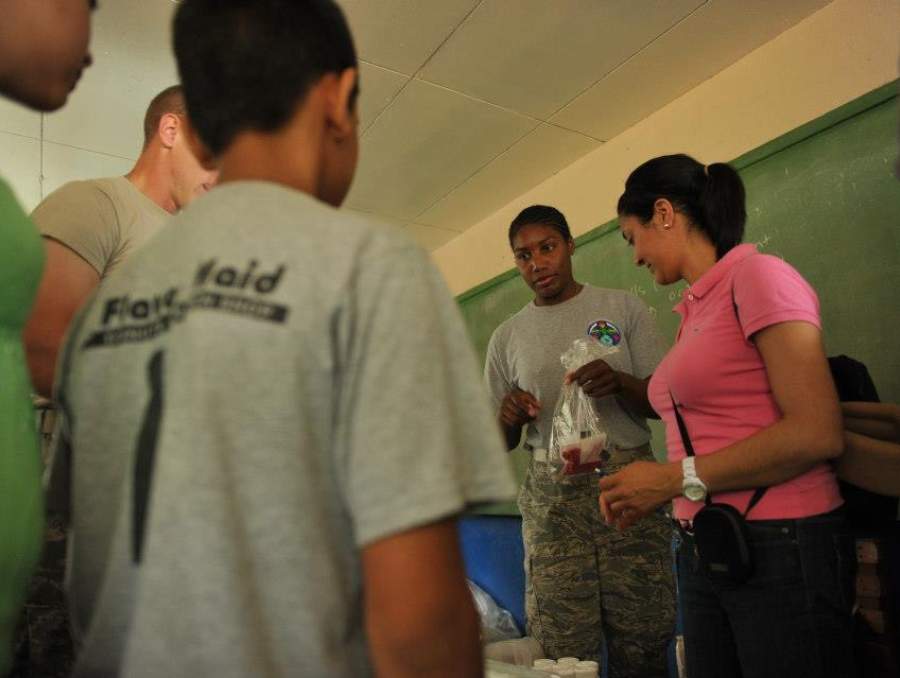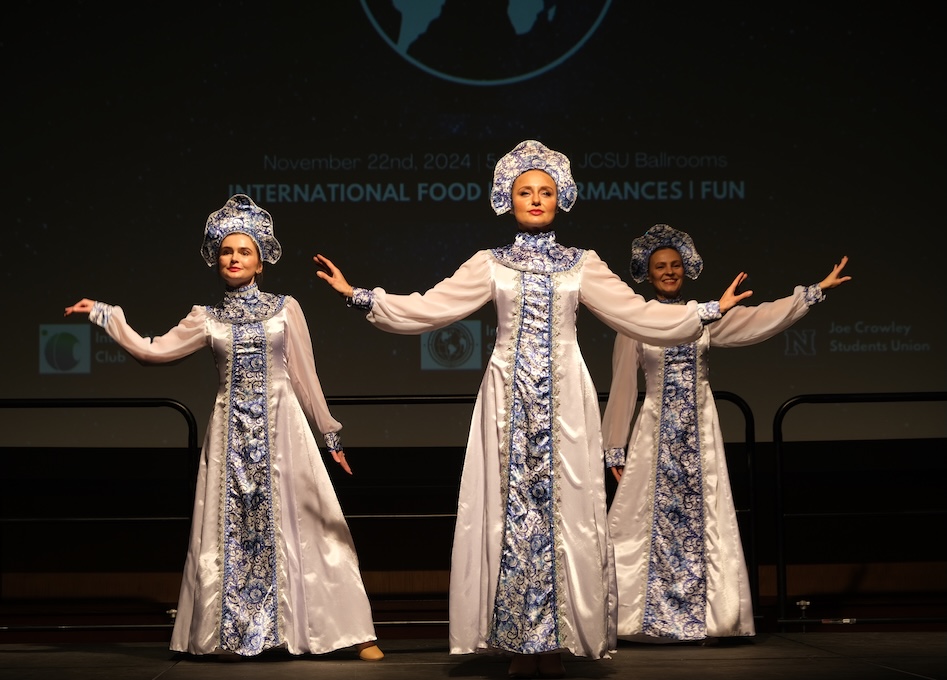University of Nevada, Reno President Milt Glick was remembered for his many actions and accomplishments as well as many memorable moments that left such an enduring imprint on the campus during Thursday's memorial service in Glick's honor at Lawlor Events Center.
Glick, the University's 15th president, passed away on April 16 at age 73. A crowd of close to 3,000 attended the ceremony.
Glick's wife Peggy, sons David and Sandy and their families, sat in the first row as the man they knew as husband and father was recalled by members of the campus community, colleagues and friends as a decisive, energetic leader who also was known for his decency and compassion.
"Today," said Provost Marc Johnson, who served as master of ceremonies of the event, "We gather to share the joyful hope that imbued the life of Milt Glick with such noble purpose - a noble purpose that made him such a good man."
Johnson said there was true affection that existed between the president and his students.
"He loved our students the way only a father could," Johnson said. "He laughed and celebrated with them. He cried with them when they faced tragedy. He took them with him, either in spirit or in person, to every meeting and every gathering and every event he ever attended. He once said that if he could, he would have bottled the students of our University up, put them on the shelves of every grocery store in Nevada, and share them at every gathering in Nevada so that our state's citizens could experience first-hand the beautiful treasure that is the potential of our young."
Johnson remembered Glick as an "uncommonly calm man."
"I think this was because he lived such a life of purpose, love and joy," Johnson said. "As I mentioned on Monday during the candlelight vigil here when more than 1,000 of our students, faculty and staff honored Milt, he was a man of clear principles. He always stated them clearly, with a mixture of decisiveness and decency that was rare.
"His decisiveness was needed on many occasions, certainly. But just as important was his inherent goodness and decency. As our campus struggled through a time of challenge, he helped us mend. He reminded us constantly that through collaboration and collegiality - two of the hallmarks of the Glick presidency - we were still capable of accomplishing great and memorable things."
Glick was also remembered for his sense of humor. Allan Price, president of the Oregon Health and Science University Foundation who was a colleague of Glick's while the two men worked at Arizona State University for a decade, smiled as he conjured what he termed "Glick's Rules."
"Be authentic," Price said of the overriding values of Glick's life. "Be who you are. Live by your values. That's what Milt did every single day."
Price said he didn't want to "reify" his old friend, and laughed as he recited conversations they had shared at ASU.
He said once Glick had told him they needed to talk. Price assumed it would be something of great import.
It was. Particularly from Glick's point of view.
"He told me, 'You need to buy some new suits,'" Price said, shaking his head at the memory. "He wasn't kidding ... He was right, by the way."
Another time, after Glick had become president at the University, Price and Glick were sharing time together when, "All of a sudden, Milt said, pumping his arm, 'The strength of the Pack is the Wolf! And the strength of the Wolf is the Pack!" As the Lawlor crowd roared, Price grinned: "I thought my friend had lost his mind."
He said such stories were indicative of an uncommon person who had an uncommon devotion to higher education.
"Milt believed passionately in the power of public higher education," Price said. "He transformed tens of thousands of lives over his career, and we all owe him a debt of gratitude."
James Dean Leavitt, chair of the Nevada System of Higher Education Board of Regents, also said he was struck by Glick's commitment to his University.
"No one loved the University of Nevada more than Milt, and nobody loved being a president more than Milt," Leavitt said.
Leavitt also poked some fun at Glick, who was often seen with a can of Diet Pepsi in one hand an ever-present BlackBerry in another.
Leavitt pulled his own cell phone out and scanned it for lyrics to the Celine Dion song, "Immortality."
"You might ask yourself, why am I reading cell phone?" Leavitt asked. "Nobody loved technology more than Milt Glick."
Rosemary McCarthy, longtime professor in the Reynolds School of Journalism, noted that Glick had an especially strong influence on the University's faculty.
She recited passages from Glick's many campus emails and his blog, "Under My Hat." In each of them, Glick would thoughtfully praise the faculty for its civility, collegiality and collaboration in what has been one of the most difficult periods in the University's 137-year history due to historic budget reductions. She said the faculty appreciated the fact that Glick often would "refer to the faculty as the engine of our campus."
"As a colleague, he knew about and valued all the things we valued," she said.
She said the budget storm that hit Nevada had shown the true worth of Glick as a leader. While other leaders might've run away from the problems, she said Glick's straightforward, honest and compassionate approach had been appreciated by the campus.
"I realized," she said of Glick's words and actions in the wake of the budget reductions, "that I was dealing with a very different caliber of man."
Eli Reilly, president of the Associated Students of the University of Nevada, Reno (ASUN) from 2008-2010, said he could still remember the first meeting he ever had with Glick.
Reilly said he was more than a little nervous and was worried how prepared he was for what would no doubt be a budget- and numbers-intensive meeting.
Glick looked formidable at first.
"He was drinking a Diet Pepsi and typing furiously on his BlackBerry," Reilly said.
Reilly quickly learned, however, that meetings with Milt Glick never followed the same script.
"We debated the superiority of Pepsi over Coke," Reilly said of how the meeting played out. "... If Ohio State would win the BCS for the following season."
Reilly said he came away from that meeting, and many more with Glick, with a simple lesson that has continued to serve the young man well: "Milt taught me the key to working with a person was getting to know them."
Early in Reilly's remarks, as he talked about how Glick greatly embraced all things University of Nevada, Reno, including "school spirit," he was interrupted. A dozen University cheerleaders and five tuba players from the University's marching band suddenly appeared from the wings of Lawlor, cheering and playing a rousing "Go! Big! Blue!" to the cheers of the crowd.
When the tubas and cheerleaders exited, Reilly said the moment reminded him how "you could always see that incredible smile of Milt's, and his clapping away furiously as he would go, 'Go! Big! Blue!'"
Reilly said since Glick's passing, in fact, it was hard not to think of everything on the campus in terms of the late leader.
On Sunday, in the hours after Glick had passed away, Reilly said he had walked the campus, and "there was not one square foot of campus I could not walk by and not be reminded of Milt." He added, "Milt believed students will change the world ... (and) this University holds the connective tissue that holds this community, this state, and this world, together."
The retired Nevada State Sen. William Raggio was the program's final speaker. Raggio, a University alumnus and the longest-serving Nevada State Senator in history, called his friend "a gentle giant of a man" who "was able to bring people together."
Raggio, known as one of the state's great stump speakers, said that accomplishment was no small feat, particularly since he didn't know what to think of Glick at first.
He noted that the bearded Glick wore a somewhat dilapidated-looking hat and that he was concerned about what type of individual his alma mater had hired as president.
"Many of us scratched our heads and wondered, 'Who the hell is this guy? He doesn't even look like a university president," Raggio said, drawing great laughter from the crowd. He added: "It didn't take long for us to find out behind that exterior was a sharp mind."
Raggio said he was impressed time and again by Glick's determination to make sure that each budget cut did not ruin the University. He said Glick would want, probably more than anything else, for the state to have a high quality university system and that "we need to respect his memory ... one that in his memory we will all work to achieve ... this is what he would want us to do."
Raggio said Glick's loss was an irreplaceable one for the University. He said one day the University will have a new president, but "that person may succeed (Glick), but Milt will never be replaced. There's not another person like Milt Glick."
Raggio said that although Glick was gone, he would never be forgotten at the University he served, or in the community he lived.
He said whenever "a gentle breeze" blows on campus, "we may even feel or see a trademark hat and maybe a gentle smile ... and know that he is still with us."
Near the end of the service, Glick's trademark hat played one final role.
Glick always loved music. As Johnson noted, come every Friday, Glick would wander the halls of the Clark Administration Building, singing show tunes.
"Sometimes, we could even understand the words," Johnson quipped.
Of all the music that filled Milt Glick's life, he loved folk music - Woody Guthrie, Pete Seeger, Joan Baez - most of all. At the end of Thursday's service, University English Professor David Fenimore was joined by his friend, Tim Gorelangton, for a guitar-based sing-along of Seeger's inspiring, "If I Had A Hammer" and Guthrie's stately, "This Land Is Your Land."
Following "If I Had A Hammer," Fenimore, a beloved campus teacher who shared many of Glick's 1960s-insprired values, stepped away from his microphone for a moment. He grabbed a hat that was very similar to the broad-rimmed hats that Glick wore; one of the late president's in fact, lay in state along with Glick's ever-present BlackBerry on a table close by.
Fenimore popped his own hat on his head and flashed a mischievous grin of pure delight. It was not unlike the thousands of heartfelt grins Milt Glick had flashed while on campus during his five-year tenure as president.
And then Fenimore, Gorelangton and the rest of the crowd launched into a joyous, uplifting version of "This Land Is Your Land."
As Fenimore's moment showed, the campus had become Glick's campus. His hat had protected it, guided it, seen it through difficulty as well as unsurpassed achievement. And at the end of the Thursday's service, the president's hat served as the ultimate, uplifting symbol of the purpose, love and joy that so fully embodied the man who wore it.
